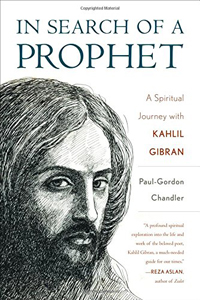 Paul-Gordon Chandler, In Search of a Prophet: A Spiritual Journey with Kahlil Gibran (New York: Rowman and Littlefield, 2017), 179pp.
Paul-Gordon Chandler, In Search of a Prophet: A Spiritual Journey with Kahlil Gibran (New York: Rowman and Littlefield, 2017), 179pp.
Here's a bit of a trick question: who was Kahlil Gibran (1883–1931)? I would count myself among those who know his name and his famous book The Prophet, which has sold a hundred million copies and been translated into over 111 languages, but who would otherwise have to confess complete ignorance. At least I'm not alone. In the introduction to his book, Paul-Gordon Chandler notes that this is a common phenomenon when it comes to Gibran, so much so that one of his biographers called him "the most famous stranger on earth, a name without a face."
Chandler's book isn't a biography in the technical sense of the word (there are several of those), even though much of it is biographical. Rather, he calls it a "type of pilgrimage into and through Kahlil's own spiritual journey." He commends the Lebanese writer, artist, and mystic as a model for our own day because of the way that he transcended the divisions between the East and West. This follows Chandler's own life and work. He grew up in Senegal, and has done extensive work in the Middle East and North Africa, including a ten-year stint as the rector of the Episcopal church in Cairo (2003–2013). He founded the non-profit CARAVAN, which uses the arts to build bridges of peace between the creeds and cultures of the Middle East and the West. Today he's the Senior Anglican Priest of The Church of the Epiphany at The Anglican Centre in Doha, Qatar.
Chandler's book is also a sort of travelogue. He explores Gibran by visiting all of the important places associated with his life and work, beginning with his birthplace in the Lebanese mountains into a Marionite Catholic family, his move to Boston at the age of twelve, two and a half years of formal art studies in Paris (where he met the sculptor Rodin), his eventual move to New York City, where he spent the last twenty years of his short life, and museums around the world that feature his work.
Gibran was a sort of heretic-rebel in the eyes of many because of his explicit rejection of traditional forms of religion, which in his view were characterized by sectarian divisions and hypocrisy. His own faith transcended all cultures and religion, and aspired toward "inclusivity, the embrace of all." Gibran "went beyond religion to the core of universal spirituality." To heed his wisdom and follow his example, urges Chandler, "would heal our world."
Dan Clendenin: dan@journeywithjesus.net


